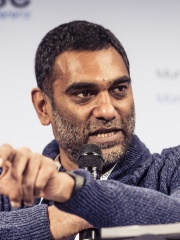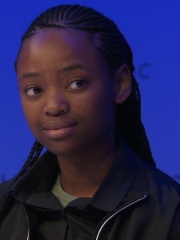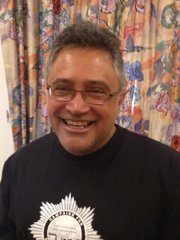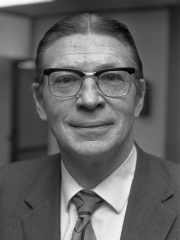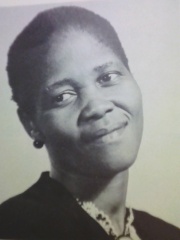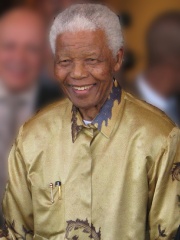


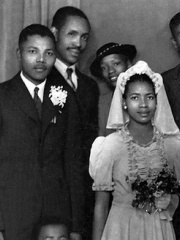

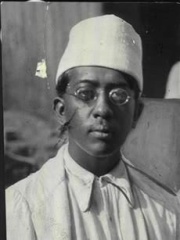
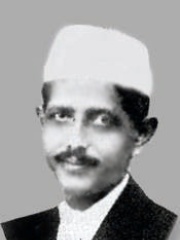
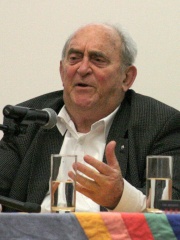
The Most Famous
SOCIAL ACTIVISTS from South Africa
This page contains a list of the greatest South African Social Activists. The pantheon dataset contains 840 Social Activists, 18 of which were born in South Africa. This makes South Africa the birth place of the 10th most number of Social Activists behind Ukraine, and Iran.
Top 10
The following people are considered by Pantheon to be the top 10 most legendary South African Social Activists of all time. This list of famous South African Social Activists is sorted by HPI (Historical Popularity Index), a metric that aggregates information on a biography's online popularity. Visit the rankings page to view the entire list of South African Social Activists.

1. Nelson Mandela (1918 - 2013)
With an HPI of 90.45, Nelson Mandela is the most famous South African Social Activist. His biography has been translated into 230 different languages on wikipedia.
Nelson Rolihlahla Mandela ( man-DEL-ə, Xhosa: [xolíɬaɬa mandɛ̂ːla]; born Rolihlahla Mandela; 18 July 1918 – 5 December 2013) was a South African anti-apartheid activist and statesman who was the first president of South Africa from 1994 to 1999. He was the country's first Black head of state and the first elected in a fully representative democratic election. His administration focused on dismantling the legacy of apartheid by fostering racial reconciliation and a multiracial democracy. Ideologically an African nationalist and socialist, he served as the president of the African National Congress (ANC) party from 1991 to 1997. Mandela was born into the Thembu royal family in Mvezo, South Africa. He studied law at the University of Fort Hare and the University of Witwatersrand before working as a lawyer in Johannesburg. There he became involved in anti-colonial and African nationalist politics, joining the ANC in 1943 and co-founding its Youth League in 1944. After the National Party's white-only government established apartheid, a system of racial segregation that privileged whites, Mandela and the ANC committed themselves to its overthrow. He was appointed president of the ANC's Transvaal branch, rising to prominence for his involvement in the 1952 Defiance Campaign and the 1955 Congress of the People. He was repeatedly arrested for seditious activities and was unsuccessfully prosecuted in the 1956 Treason Trial. Influenced by Marxism, he secretly joined the banned South African Communist Party (SACP). Although initially committed to non-violent protest, in association with the SACP he co-founded the militant uMkhonto we Sizwe in 1961 that led a sabotage campaign against the apartheid government. He was arrested and imprisoned in 1962, and, following the Rivonia Trial, was sentenced to life imprisonment for conspiring to overthrow the state. Mandela served 27 years in prison, split between Robben Island, Pollsmoor Prison, and Victor Verster Prison. Amid growing domestic and international pressure and fears of racial civil war, President F. W. de Klerk released him in 1990. Mandela and de Klerk led efforts to negotiate an end to apartheid, which resulted in the 1994 multiracial general election in which Mandela led the ANC to victory and became president. Leading a broad coalition government which promulgated a new constitution, Mandela emphasised reconciliation between the country's racial groups and created the Truth and Reconciliation Commission to investigate past human rights abuses. Economically, his administration retained its predecessor's liberal framework despite his own socialist beliefs, also introducing measures to encourage land reform, combat poverty and expand healthcare services. Internationally, Mandela acted as mediator in the Pan Am Flight 103 bombing trial and served as secretary-general of the Non-Aligned Movement from 1998 to 1999. He declined a second presidential term and was succeeded by his deputy, Thabo Mbeki. Mandela became an elder statesman and focused on combating poverty and HIV/AIDS through the charitable Nelson Mandela Foundation. Mandela was a controversial figure for much of his life. Although critics on the right denounced him as a communist terrorist and those on the far left deemed him too eager to negotiate and reconcile with apartheid's supporters, he gained international acclaim for his activism. Globally regarded as an icon of moral leadership, democracy and social justice, he received more than 250 honours, including the Nobel Peace Prize. He is held in deep respect within South Africa, where he is often referred to by his Thembu clan name, Madiba, and described as the "Father of the Nation". Mandela is widely considered one of the greatest and most admired figures of the 20th century.

2. Steve Biko (1946 - 1977)
With an HPI of 68.30, Steve Biko is the 2nd most famous South African Social Activist. His biography has been translated into 72 different languages.
Bantu Stephen Biko OMSG (18 December 1946 – 12 September 1977) was a South African anti-apartheid activist. Ideologically an African nationalist and African socialist, he was at the forefront of a grassroots anti-apartheid campaign known as the Black Consciousness Movement during the late 1960s and 1970s. His ideas were articulated in a series of articles published under the pseudonym Frank Talk. Raised in a poor Xhosa family, Biko grew up in Ginsberg township in the Eastern Cape. In 1966, he began studying medicine at the University of Natal, where he joined the National Union of South African Students (NUSAS). Strongly opposed to the apartheid system of racial segregation and white-minority rule in South Africa, Biko was frustrated that NUSAS and other anti-apartheid groups were dominated by white liberals, rather than by the blacks who were most affected by apartheid. He believed that well-intentioned white liberals failed to comprehend the black experience and often acted in a paternalistic manner. He developed the view that to avoid white domination, black people had to organise independently, and to this end he became a leading figure in the creation of the South African Students' Organisation (SASO) in 1968. Membership was open only to "Blacks", a term that Biko used in reference not just to Bantu-speaking Africans but also to Coloureds and Indians. He was careful to keep his movement independent of white liberals, but opposed anti-white hatred and had white friends. The white-minority National Party government were initially supportive, seeing SASO's creation as a victory for apartheid's ethos of racial separatism. Influenced by the Martinican philosopher Frantz Fanon, Biko and his compatriots developed Black Consciousness as SASO's official ideology. The movement campaigned for an end to apartheid and the transition of South Africa toward universal suffrage and a socialist economy. It organised Black Community Programmes (BCPs) and focused on the psychological empowerment of black people. Biko believed that black people needed to rid themselves of any sense of racial inferiority, an idea he expressed by popularizing the slogan "black is beautiful". In 1972, he was involved in founding the Black People's Convention (BPC) to promote Black Consciousness ideas among the wider population. The government came to see Biko as a subversive threat and placed him under a banning order in 1973, severely restricting his activities. He remained politically active, helping organise BCPs such as a healthcare centre and a crèche in the Ginsberg area. During his ban he received repeated anonymous threats, and was detained by state security services on several occasions. Following his arrest in August 1977, Biko was beaten to death by state security officers. Over 20,000 people attended his funeral. Biko's fame spread posthumously. He became the subject of numerous songs and works of art, while a 1978 biography by his friend Donald Woods formed the basis for the 1987 film Cry Freedom. During Biko's life, the government alleged that he hated whites, various anti-apartheid activists accused him of sexism, and African racial nationalists criticised his united front with Coloureds and Indians. Nonetheless, Biko became one of the earliest icons of the movement against apartheid, and is regarded as a political martyr and the "Father of Black Consciousness". His political legacy remains a matter of contention.

3. Frances Ames (1920 - 2002)
With an HPI of 58.17, Frances Ames is the 3rd most famous South African Social Activist. Her biography has been translated into 17 different languages.
Frances Rix Ames (; 20 April 1920 – 11 November 2002) was a South African neurologist, psychiatrist, and human rights activist, best known for leading the medical ethics inquiry into the death of anti-apartheid activist Steve Biko, who died from medical neglect after being tortured in police custody. When the South African Medical and Dental Council (SAMDC) declined to discipline the chief district surgeon and his assistant who treated Biko, Ames and a group of five academics and physicians raised funds and fought an eight-year legal battle against the medical establishment. Ames risked her personal safety and academic career in her pursuit of justice, taking the dispute to the South African Supreme Court, where she eventually won the case in 1985. Born in Pretoria and raised in poverty in Cape Town, Ames became the first woman to receive a Doctor of Medicine degree from the University of Cape Town in 1964. Ames studied the effects of cannabis on the brain and published several articles on the subject. Seeing the therapeutic benefits of cannabis on patients in her own hospital, she became an early proponent of legalization for medicinal use. She headed the neurology department at Groote Schuur Hospital before retiring in 1985, but continued to lecture at Valkenberg and Alexandra Hospital. After apartheid was dismantled in 1994, Ames testified at the Truth and Reconciliation Commission about her work on the "Biko doctors" medical ethics inquiry. In 1999, Nelson Mandela awarded Ames the Star of South Africa, the country's highest civilian award, in recognition of her work on behalf of human rights.

4. Evelyn Mase (1922 - 2004)
With an HPI of 58.08, Evelyn Mase is the 4th most famous South African Social Activist. Her biography has been translated into 19 different languages.
Evelyn Ntoko Mase (18 May 1922 – 30 April 2004), later named Evelyn Rakeepile, was the first wife of the South African anti-apartheid activist and the future president Nelson Mandela, to whom she was married from 1944 to 1958. Mase was a nurse by profession. Born in Engcobo, Transkei, Mase was orphaned as a child. She moved to Johannesburg to train as a nurse, and there met and married Mandela. Living together in Soweto, they raised four children, three of whom—Thembekile, Makgatho, and Makaziwe—survived into adulthood. She trained to be a midwife while working as a nurse. In the 1950s, her relationship with Mandela became strained. He was becoming increasingly involved in the African National Congress and its campaign against apartheid; Mase eschewed politics and became a Jehovah's Witness. She also accused him of adultery with several women, an accusation corroborated by later biographies, and of being physically abusive, something he always denied. They separated in 1956. She initially filed for divorce, but did not go through with the legal proceedings. In 1958, Mandela, who was hoping to marry Winnie Madikizela, obtained an uncontested divorce from Mase. Taking the children, Mase moved to Cofimvaba and opened a grocery store. She generally avoided publicity, but spoke to South African reporters when Mandela was released from prison after 27 years in 1990. Deepening her involvement with the Jehovah's Witnesses, in 1998 she married a businessman, Simon Rakeepile. She died in 2004 following a respiratory illness. Her funeral attracted international media attention and was attended by Mandela, Winnie Madikizela-Mandela, and Mandela's third wife, Graça Machel.
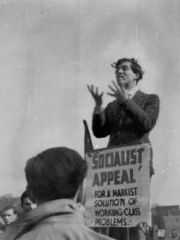
5. Ted Grant (1913 - 2006)
With an HPI of 55.02, Ted Grant is the 5th most famous South African Social Activist. His biography has been translated into 17 different languages.
Edward Grant (born Isaac Blank; 9 July 1913 – 20 July 2006) was a South African Trotskyist who spent most of his adult life in Britain. He was a founding member of the group Militant and later Socialist Appeal.

6. Bram Fischer (1908 - 1975)
With an HPI of 54.17, Bram Fischer is the 6th most famous South African Social Activist. His biography has been translated into 16 different languages.
Abraham Louis Fischer (23 April 1908 – 8 May 1975) was a South African Communist lawyer of Afrikaner descent with partial Anglo-African ancestry from his paternal grandmother, notable for anti-apartheid activism and for the legal defence of anti-apartheid figures, including Nelson Mandela, at the Rivonia Trial. Following the trial, he was himself put on trial accused of furthering communism. He was sentenced to life imprisonment and diagnosed with cancer while in prison. The South African Prisons Act was extended to include his brother's house in Bloemfontein, where he died two months later.

7. Devdas Gandhi (1900 - 1957)
With an HPI of 54.07, Devdas Gandhi is the 7th most famous South African Social Activist. His biography has been translated into 20 different languages.
Devdas Mohandas Gandhi (22 May 1900 – 3 August 1957) was the fourth and youngest son of Mahatma Gandhi and Kasturba Gandhi. He was born in the Colony of Natal and came to India with his parents as a grown man. He became active in his father's movement, spending many terms in jail. He also became a prominent journalist, serving as editor of Hindustan Times. He was also the first pracharak of the Dakshina Bharat Hindi Prachar Sabha (DBHPS), established by Mohandas Gandhi in Tamil Nadu in 1918. The purpose of the Sabha was to propagate Hindi in southern India.

8. Ramdas Gandhi (1897 - 1969)
With an HPI of 54.07, Ramdas Gandhi is the 8th most famous South African Social Activist. His biography has been translated into 17 different languages.
Ramdas Mohandas Gandhi (4 May 1897 – 14 April 1969) was the third son of Mahatma Gandhi. He was a freedom activist in his own right.

9. Denis Goldberg (1933 - 2020)
With an HPI of 52.68, Denis Goldberg is the 9th most famous South African Social Activist. His biography has been translated into 18 different languages.
Denis Theodore Goldberg (11 April 1933 – 29 April 2020) was a South African social campaigner who was active in the struggle against apartheid. He was accused No. 3 of 11 defendants in the Rivonia Trial of 1964, alongside the better-known Nelson Mandela and Walter Sisulu. He was the youngest of the defendants. He was convicted and imprisoned for 22 years, along with other key members of the anti-apartheid movement in South Africa. After his release in 1985, he continued to campaign against apartheid from his base in London with his family. The apartheid system was fully abolished with the 1994 election. He returned to South Africa in 2002 and founded the non-profit Denis Goldberg Legacy Foundation Trust in 2015. He was diagnosed with lung cancer in July 2017, and died in Cape Town on 29 April 2020.
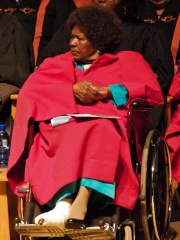
10. Albertina Sisulu (1918 - 2011)
With an HPI of 51.77, Albertina Sisulu is the 10th most famous South African Social Activist. Her biography has been translated into 24 different languages.
Albertina Sisulu OMSG (née Nontsikelelo Thethiwe; 21 October 1918 – 2 June 2011) was a South African anti-apartheid activist. A member of the African National Congress (ANC), she was the founding co-president of the United Democratic Front. In South Africa, where she was affectionately known as Ma Sisulu, she is often called a mother of the nation. Born in rural Transkei, Sisulu moved to Johannesburg in 1940 and was a nurse by profession. She entered politics through her marriage to Walter Sisulu and became increasingly engaged in activism after his imprisonment in the Rivonia Trial. In the 1980s she emerged as a community leader in her hometown of Soweto, assuming a prominent role in the establishment of the UDF and the revival of the Federation of South African Women. Between 1964 and 1989, she was subject to a near-continuous string of banning orders. In addition to intermittent detention without trial, she was subject to criminal charges on three occasions: she was acquitted of violating pass laws in 1958, convicted of violating the Suppression of Communism Act in 1984, and acquitted of violating the Internal Security Act in the 1985 Pietermaritzburg Treason Trial. After the end of apartheid, Sisulu represented the ANC in the first democratic Parliament before she retired from politics in 1999. She was also the deputy president of the ANC Women's League from 1991 to 1993 and a member of the ANC National Executive Committee from 1991 to 1994.
People
Pantheon has 18 people classified as South African social activists born between 1897 and 2002. Of these 18, 3 (16.67%) of them are still alive today. The most famous living South African social activists include Kumi Naidoo, Ayakha Melithafa, and Zackie Achmat. The most famous deceased South African social activists include Nelson Mandela, Steve Biko, and Frances Ames. As of April 2024, 1 new South African social activists have been added to Pantheon including Zackie Achmat.
Living South African Social Activists
Go to all RankingsKumi Naidoo
1965 - Present
HPI: 44.35
Ayakha Melithafa
2002 - Present
HPI: 37.84
Zackie Achmat
1962 - Present
HPI: 36.24
Deceased South African Social Activists
Go to all RankingsNelson Mandela
1918 - 2013
HPI: 90.45
Steve Biko
1946 - 1977
HPI: 68.30
Frances Ames
1920 - 2002
HPI: 58.17
Evelyn Mase
1922 - 2004
HPI: 58.08
Ted Grant
1913 - 2006
HPI: 55.02
Bram Fischer
1908 - 1975
HPI: 54.17
Devdas Gandhi
1900 - 1957
HPI: 54.07
Ramdas Gandhi
1897 - 1969
HPI: 54.07
Denis Goldberg
1933 - 2020
HPI: 52.68
Albertina Sisulu
1918 - 2011
HPI: 51.77
Beyers Naudé
1915 - 2004
HPI: 49.57
Lillian Ngoyi
1911 - 1980
HPI: 44.55
Newly Added South African Social Activists (2025)
Go to all RankingsOverlapping Lives
Which Social Activists were alive at the same time? This visualization shows the lifespans of the 15 most globally memorable Social Activists since 1700.

